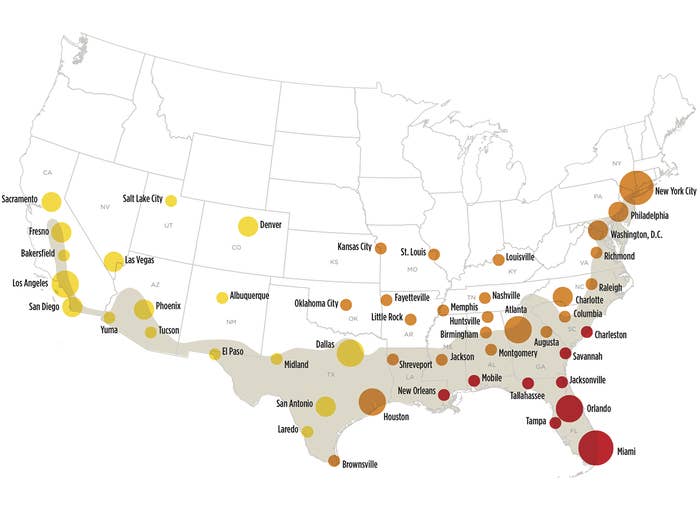
Summer months will see the kind of mosquitoes that carry Zika virus arrive in New York and Los Angeles, climate scientists estimated in a map released on Wednesday. (See high-res version here.)
Although U.S. winter temperatures are too cold for these Aedes aegypti mosquitoes outside south Florida and south Texas, summer temperatures should see them spreading north, according to researchers from the National Center for Atmospheric Research and NASA's Marshal Space Flight Center.
“We’re trying to take a first stab at the seasonality of this mosquito,” NCAR scientist Andrew Monaghan, the lead author of the study, told BuzzFeed News. He hopes the study alerts mosquito control officials north of Florida and Texas about the range of the mosquito, telling them when and where to concentrate efforts.
“We don’t want to alarm people, we’re not expecting to see a Zika pandemic in the United States like we’ve seen elsewhere because of mosquito controls and our homes are better sealed,” Monaghan added.
The Aedes mosquitoes are seen as the major carrier for the huge Zika virus outbreak that started last year in Brazil and has now spread to dozens of regions, as far north as Mexico and Puerto Rico.
In a PLOS Currents: Outbreaks study, the researchers added travel patterns from Zika-infected regions to 50 U.S. cities stretching from New York to L.A. to calculate those most at risk of local virus outbreaks this summer. By mid-July, all 50 cities, as far north as Denver and St. Louis, would be at some risk, the study concludes, but it finds the greatest danger for Miami and the rest of south Florida, along with poor parts of south Texas.
There is a 40% to 45% chance of warmer-than-normal U.S. summer temperatures, the researchers noted, which would increase the range of those mosquitoes. But if it gets too warm, particularly in Texas, Arizona, and California, then their ranges could shrink because drought there would mean less water for them to breed and mature in.
If Zika virus establishes a toehold in southern states this summer, Monaghan predicted it would not spread far, because of air conditioning and screens in U.S. homes, as well as mosquito control efforts.
Altitude is also important, as the insects don't seem to live at high elevations. The U.S. CDC told travelers last week that locations 6,500 feet above sea level should be safe to avoid Zika infections.
